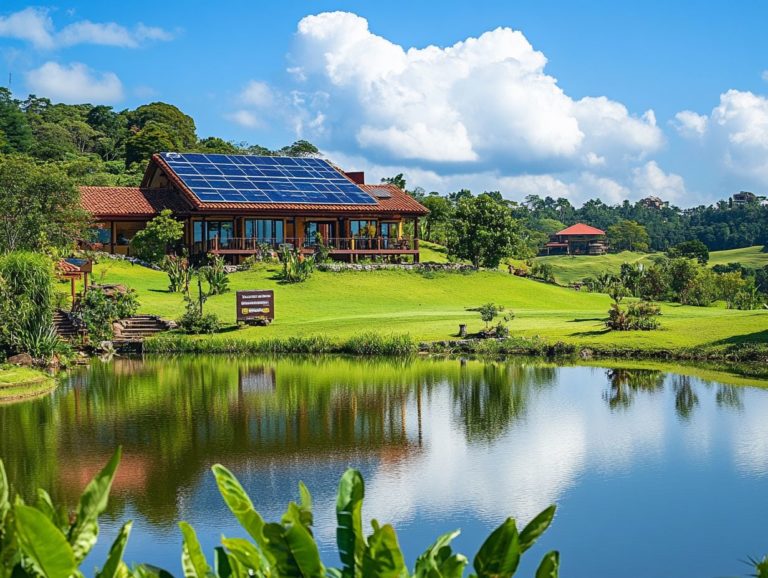Best Eco-Friendly Cities for Foodies
In today s landscape, where sustainability intertwines with food experiences, eco-friendly cities are rising in popularity among discerning food enthusiasts, emphasizing sustainable practices.
From immersive farm-to-table experiences to cutting-edge plant-based restaurants, these vibrant cities are bursting with local and organic flavors waiting for you to explore!
Dive into our meticulously curated list of the best eco-friendly cities for food lovers, where each destination presents a distinctive fusion of flavor and food sustainability.
Discover exciting spots where you can enjoy delicious meals while helping the planet through local sourcing and reducing your carbon footprint!
Contents
- Key Takeaways:
- 1. Portland, Oregon
- 2. San Francisco, California
- 3. Vancouver, Canada
- 4. Amsterdam, Netherlands
- 5. Copenhagen, Denmark
- 6. Stockholm, Sweden
- 7. Berlin, Germany
- 8. Melbourne, Australia
- 9. Singapore
- 10. Barcelona, Spain
- 11. London, United Kingdom
- 12. Montreal, Canada
- 13. Tokyo, Japan
- 14. Seattle, Washington
- 15. Austin, Texas
- Frequently Asked Questions
- What does it mean for a city to be considered eco-friendly for foodies?
- Which city is considered the best eco-friendly city for foodies?
- What are some eco-friendly dining options in these cities?
- How can I support eco-friendly practices while dining in these cities?
- Are there any food festivals or events in these cities that focus on sustainability?
- Can I find eco-friendly food options in other cities outside of the ones mentioned?
Key Takeaways:
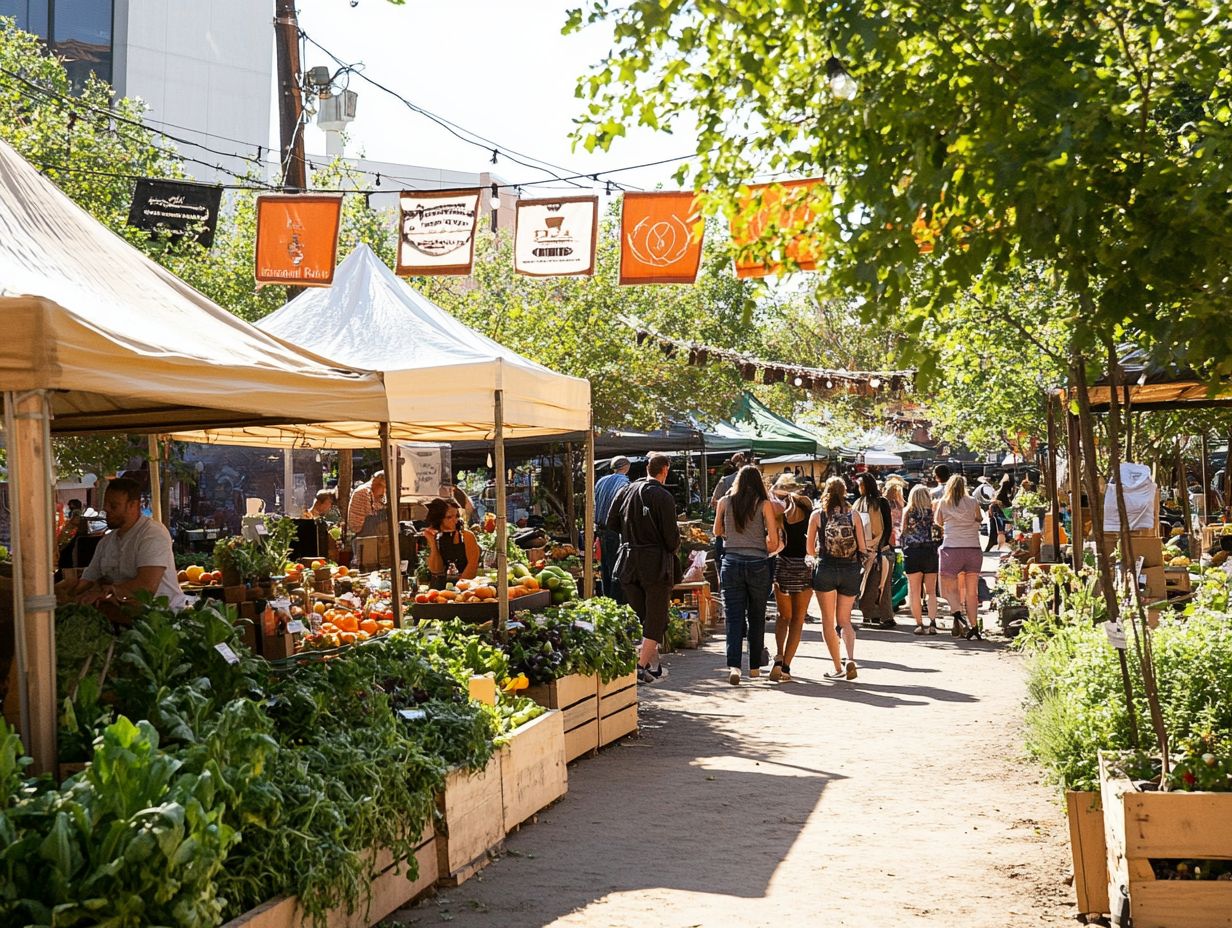
- Experience a combination of sustainable practices and diverse culinary options in Portland, Oregon.
- Indulge in organic and locally-sourced meals while exploring the vibrant food scene of San Francisco, California.
- Vancouver, Canada offers a unique fusion of eco-friendly practices and multicultural flavors for foodies to enjoy.
1. Portland, Oregon
Portland, Oregon, emerges as a shining example of sustainable practices and forward-thinking food policies. Here, plant-based options take center stage, and climate change is actively tackled through initiatives like the DefaultVeg initiative, which reduces meat consumption in the community.
You’ll find a city dedicated to reducing its carbon footprint by promoting local sourcing of ingredients, enhancing food security, and supporting community gardens that provide eco-friendly solutions to urban food needs. For those interested in exploring more environmentally friendly destinations, check out the top 10 eco-conscious cities to visit in 2024.
The local government plays a critical role in these endeavors with its progressive food procurement policies that prioritize purchases from sustainable, local producers. This commitment not only spurs economic growth within the community but also significantly cuts down food-related emissions by minimizing transportation distances, addressing the environmental destruction linked to our food systems.
The Better Food Foundation collaborates closely with schools and restaurants to advocate for healthier food choices and educational programs that raise nutrition awareness. Together, these initiatives foster a vibrant food culture that champions sustainability and guarantees access to fresh produce.
This effort cultivates a strong sense of community among those who care deeply about their food systems, including public institutions and the Better Food Foundation.
2. San Francisco, California
San Francisco, California, stands at the forefront of sustainable food policies, leading the charge with climate-friendly initiatives that focus on reducing food waste and promoting urban gardens across the city. These efforts are aligned with the C40 Good Food Cities network, which is a collaboration of cities working to tackle climate change.
The city’s ambitious composting program invites you and your fellow residents to divert organic waste from landfills, significantly cutting down on methane emissions. By partnering with C40 Cities, San Francisco amplifies its commitment to establishing a robust local food system that prioritizes sustainability and addresses greenhouse gas emissions.
Through engaging educational workshops and community involvement, residents are encouraged to partake in urban agriculture projects that bolster food security and enhance biodiversity, supporting the ecological transition towards healthier food options.
This collective effort unites a diverse group of stakeholders, from city officials to grassroots organizations, all united in the mission to cultivate a greener, healthier urban environment.
3. Vancouver, Canada
Vancouver, Canada, shines as a leader in sustainable food practices! The city emphasizes plant-based diets to enhance food security and reduce harm to the environment through local sourcing initiatives that lower the carbon footprint associated with animal products.
Vancouver has rolled out impressive community programs to increase access to locally grown produce. These initiatives contribute to health policies that promote a nutritious diet. Think farmers’ markets and vibrant community gardens, which encourage healthier eating habits and foster a strong sense of community among residents.
By partnering with local farms, Vancouver ensures that fresh fruits and vegetables are always at your fingertips. This reduces reliance on imported goods and minimizes transportation-related carbon emissions.
Initiatives like the Plant-Based Menu Challenge invite restaurants to integrate more plant-forward options. This ultimately improves public health outcomes while championing environmental stewardship and reducing overall food waste. These collective efforts strengthen local economies and play a pivotal role in the city s commitment to sustainability and food equity.
4. Amsterdam, Netherlands
Amsterdam, Netherlands, stands out for its eco-minded approach to food culture. The city promotes sustainable practices that not only enhance a nutritious diet but also reduce its carbon footprint through zero waste initiatives.
As you explore this vibrant city, you’ll notice community gardens integrated into the urban landscape. These invite you to engage with food production while fostering a connection to local food systems. They do more than supply fresh produce; they serve as educational hubs, where you can learn about the benefits of growing your own food and making informed dietary choices that support food equity.
Various programs enlighten you on how your food choices impact personal health and the environment, reinforcing a culture of sustainability. Through workshops, cooking classes, and farm-to-table events, you’ll immerse yourself in a culinary revolution that champions fresh, locally sourced ingredients, all while connecting with the community around you.
5. Copenhagen, Denmark
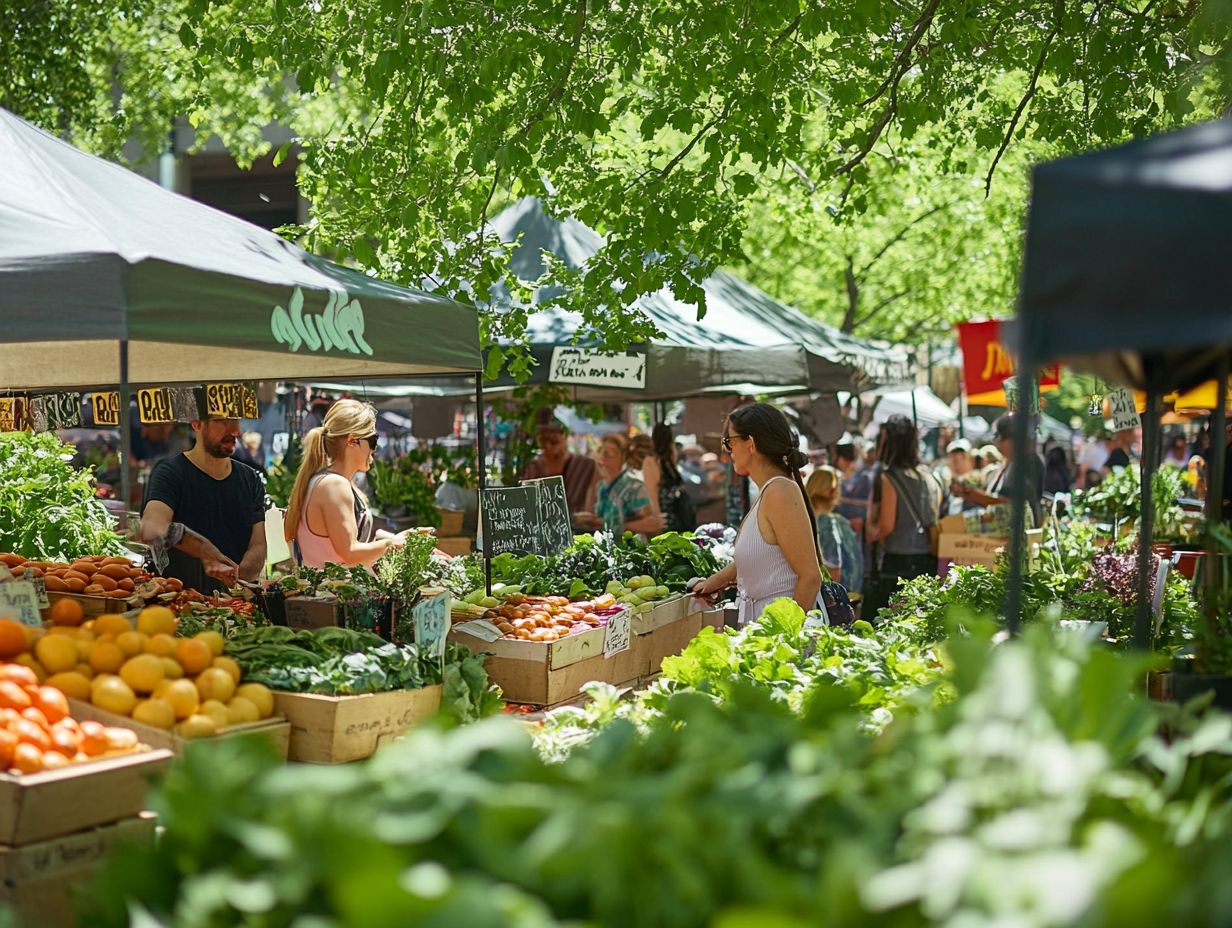
Copenhagen, Denmark, is a beacon of progressive food policies! The city showcases its dedication to the C40 Good Food Cities initiative, a global network of cities promoting sustainable food practices while addressing the challenges of access to food.
In this vibrant city, witness a transformation of food systems through innovative programs that reduce greenhouse gas emissions and promote healthier eating habits. Educational outreach programs, along with urban gardening, not only decrease transportation emissions by fostering local food production but also inspire communities to connect with fresh, seasonal produce.
Public campaigns are underway to inform citizens about the environmental implications of their dietary choices. This gently guides them toward more sustainable and nutritious options aligned with the Planetary Health Diet. The integration of these strategies reflects a comprehensive approach that tackles both climate goals and public health, making the city a captivating case study in urban sustainability.
6. Stockholm, Sweden
Stockholm, Sweden, stands tall in the realm of sustainable food procurement! The city champions a climate-conscious approach that aligns with the Planetary Health Diet and public health initiatives, further enhancing food security.
This commitment addresses pressing environmental issues and underscores the vital role of nutrition in enhancing community well-being. By forging strategic partnerships with local farms and food cooperatives, the city enhances food security while actively minimizing carbon footprints.
Innovative programs like “Matsmart” tackle food waste by redistributing surplus food to those in need. This ensures vulnerable populations have access to healthy options while promoting nutritional benefits. These initiatives strengthen the local economy and empower residents to make informed dietary choices that benefit both their health and the broader ecosystem.
In conclusion, the sustainable food practices across these cities showcase a collective impact on the environment and public health. By embracing local sourcing, community engagement, and innovative initiatives, these urban centers highlight the importance of making informed food choices for a better future, as seen in the rise of eco-friendly urban destinations.
7. Berlin, Germany
Berlin, Germany, shines as a hub for exciting food programs that empower communities! These initiatives help cultivate community resilience, improve dietary habits, and effectively utilize food banks to tackle food insecurity through innovative food procurement strategies.
Urban gardens are plentiful in Berlin, offering fresh produce and educational spaces. Here, you can immerse yourself in the art of growing your own food. This hands-on experience promotes healthier eating choices and lessens your reliance on heavily processed items.
The food banks in Berlin play an essential role in your community, distributing surplus food to those in need. This ensures that no one goes hungry while simultaneously reducing waste and addressing issues of food availability. Community-driven events celebrate cultural diversity and unity, fostering collaboration among people from different backgrounds. This ultimately enhances the local food landscape for everyone involved, including support for food banks and SNAP programs.
8. Melbourne, Australia
Melbourne, Australia, stands out for its eco-friendly commitment to sustainability. The city champions community gardens and local sourcing practices that enhance both food security and environmental health, showcasing initiatives toward an ecological transition.
In this vibrant city, you’ll find a range of initiatives dedicated to cultivating urban gardens, including the beloved community-run Carlton Gardens and the thriving sustainable farms at the Melbourne Community Food Centre. These projects promote healthier food options and local sourcing, creating a sense of camaraderie among residents.
By engaging in local sourcing practices, you support the economy and local farmers while elevating public health by gaining access to nutritious food options. With a growing awareness of where food comes from, you’re given the power to make healthier choices, contributing to a more resilient community overall while supporting sustainable practices.
9. Singapore
Singapore is at the forefront of sustainable food security initiatives, taking bold steps to tackle climate change while ensuring that urban food solutions are accessible to every resident. This aligns with the C40 Good Food Cities framework, a network focusing on sustainable urban food systems.
In this small yet remarkably progressive nation, a variety of innovative strategies are being employed to enhance food availability. This includes promoting plant-based diets and reducing meat consumption. Vertical farming and community gardens make the most of limited urban spaces, showcasing efficiency and creativity.
The government plays a pivotal role in nurturing sustainable practices through supportive food policies and financial incentives designed to encourage local food production, including initiatives like the DefaultVeg initiative. By engaging with communities, authorities educate residents about nutrition and sustainability while fostering a sense of collective responsibility.
These initiatives are crucial not just for bolstering resilience against environmental challenges but also for paving the way for a more self-reliant and food-secure society. This equips us to adapt to future uncertainties while addressing food-related emissions.
10. Barcelona, Spain
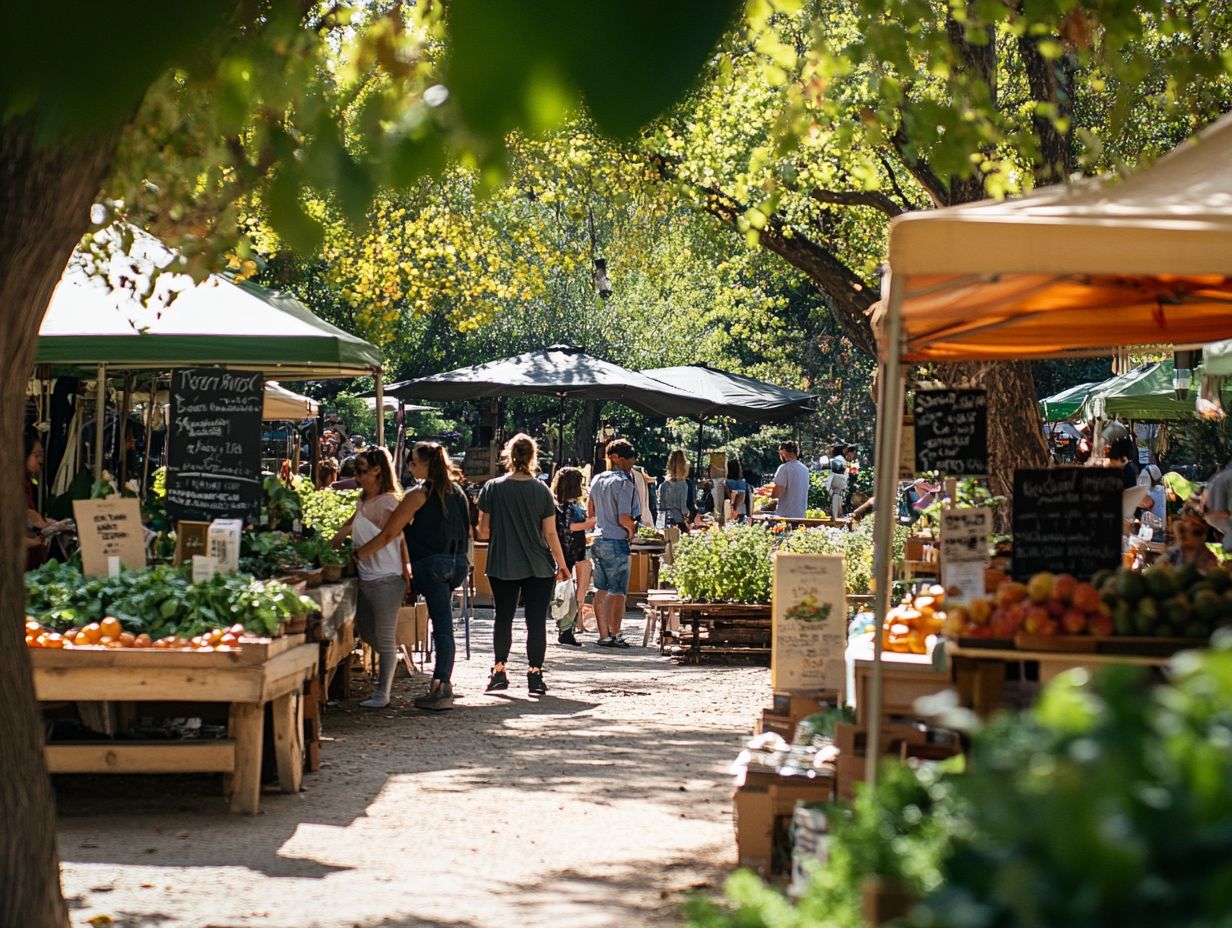
Barcelona is bustling with a food culture focused on sustainability. Public institutions lead eco-friendly initiatives that encourage healthier food choices.
These programs teach the importance of sustainable eating. They highlight the benefits of local produce and plant-based diets.
Community events, like farmers’ markets and cooking workshops, showcase seasonal ingredients. These events inspire a deeper connection with food sources.
The city collaborates with environmentally friendly groups to promote healthy eating in schools. Children learn about nutritional benefits and food security from a young age.
Through these efforts, Barcelona nurtures an environment where healthy, sustainable eating is a part of daily life.
11. London, United Kingdom
London is making impressive strides toward sustainable food policies that minimize the city’s carbon footprint. The focus is on enhancing community gardens for urban agriculture, which support the eco-friendly movement.
These initiatives encourage healthier eating habits and cultivate a sense of community and environmental responsibility.
Policies supporting urban agriculture have sparked community gardening projects in places like Hackney and Brixton. Locals transform abandoned spaces into vibrant plots of fresh produce, improving local food availability.
These gardens make nutritious options more accessible, reduce food transport needs, and promote local sourcing. They also improve air quality and help mitigate urban heat, fostering community ties.
12. Montreal, Canada
Montreal stands as a beacon for sustainable and urban food practices. The city actively supports community gardens that enhance food security and promote healthy dietary choices.
Through collaboration with local organizations, Montreal is building a robust food system that meets nutritional needs. Programs like the SNAP program empower communities.
Innovative solutions such as rooftop gardens and edible landscapes diversify produce options and reduce food waste.
Initiatives that educate citizens about food sourcing and gardening techniques enrich the culture of sustainability. As this vibrant approach evolves, it demonstrates how urban agriculture connects communities to their food systems and reduces greenhouse gas emissions.
13. Tokyo, Japan
Discover the vibrant food scene in Tokyo, where tradition meets innovation! Tokyo, Japan, masterfully blends traditional food culture with innovative practices to protect the environment, placing a spotlight on local sourcing to enhance food availability while minimizing environmental impact and food-related emissions.
In recent years, you ve likely noticed the city s remarkable transformation, as restaurants and markets increasingly join forces with local farmers to champion seasonal produce and reduce animal products in their offerings. This collaboration ensures that your ingredients are as fresh as they can be.
This shift not only bolsters regional agriculture but also educates you about the myriad benefits of eating locally, reducing food purchases from distant sources and fostering a community-centric approach to dining.
By prioritizing these sustainable practices, Tokyo is leading the charge in highlighting the importance of awareness of environmental destruction, resulting in healthier food choices for you and a reduced carbon footprint from long-distance food transport under the Paris Agreement. For those looking to enjoy meals out, check out these tips for finding eco-friendly restaurants.
Ultimately, these initiatives create a vibrant food ecosystem that enhances both public health and the environment, while promoting the Better Food Foundation principles.
14. Seattle, Washington
Seattle, Washington, stands as a beacon of sustainable practices, dedicated to empowering community gardens, enhancing food security, and promoting public health initiatives throughout the city with support from C40 Cities, an organization of cities committed to tackling climate change.
This commitment shines through in the city s vibrant, community-driven efforts, which actively encourage collaboration among residents, local businesses, and organizations, all focusing on ways to lower pollution. By offering resources and support for urban agriculture, the local government has created an environment where individuals can cultivate their own food, significantly reducing reliance on external sources.
These initiatives not only improve food accessibility but also foster a sense of belonging and pride within neighborhoods, reinforcing the importance of environmental destruction awareness. The ripple effect of these collective efforts manifests in better health outcomes, reduced carbon footprints, and strengthened social ties, illustrating how united action can forge a more resilient and sustainable food system for all residents, as seen in cities like New York City and Los Angeles.
15. Austin, Texas
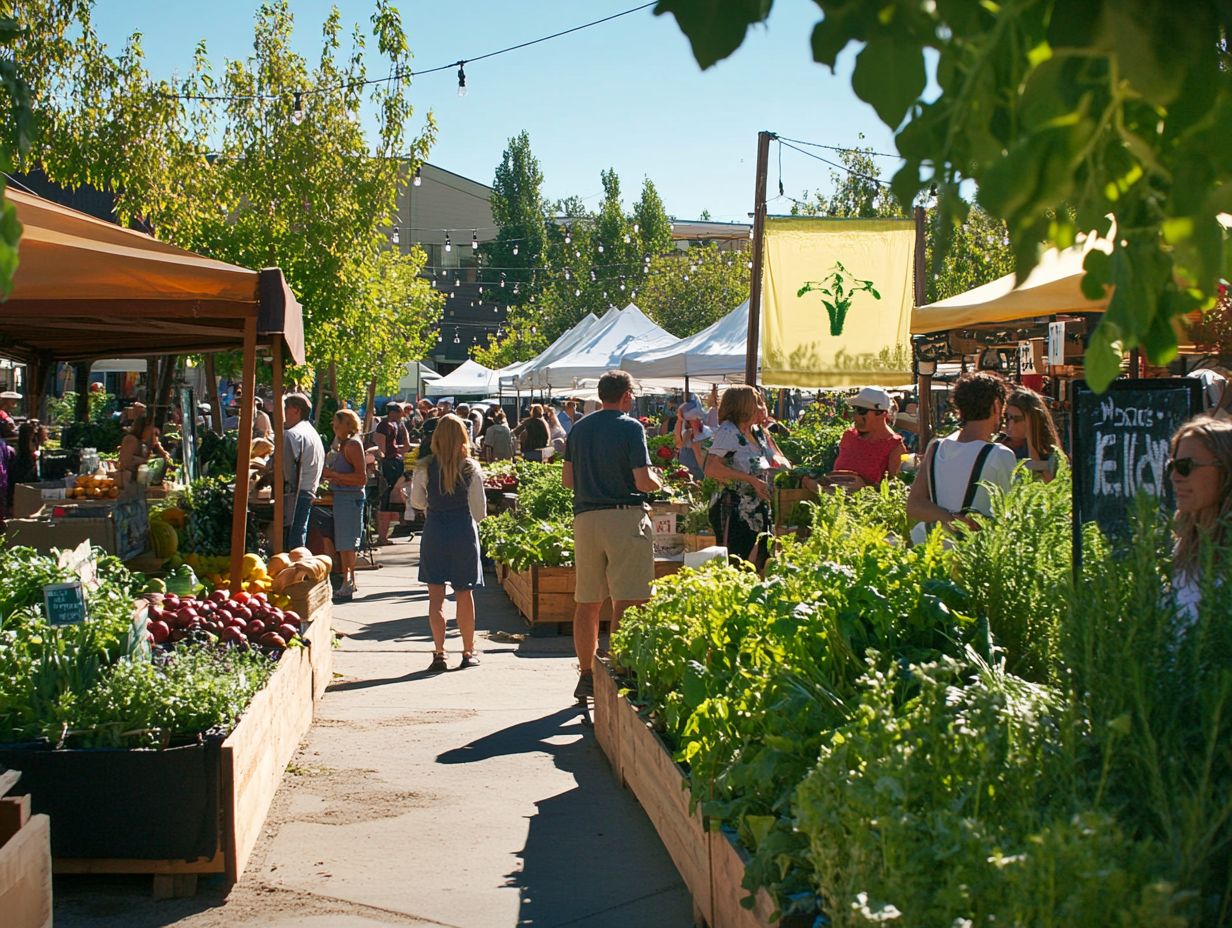
Austin, Texas, presents a vibrant food culture that embraces sustainable practices and climate-friendly initiatives, all bolstered by urban gardens that enrich local food systems and reduce food waste.
These gardens not only supply fresh produce to the community but also act as educational centers where you can learn about eco-friendly gardening methods, the advantages of organic farming, and the importance of dietary choices. Local residents engage actively in these initiatives, cultivating a sense of unity and promoting responsible consumption habits.
City policies increasingly reflect these values, offering incentives and resources that empower community members to nurture their green spaces and support the C40 initiatives.
Austin’s urban gardens play a crucial role in addressing food security while also fostering an environmentally conscious community and reducing food policy challenges.
Frequently Asked Questions
What does it mean for a city to be considered eco-friendly for foodies?
An eco-friendly city for foodies is one that prioritizes sustainable and ethical practices in its food production, consumption, and waste management, focusing on reducing food-related emissions. This includes organic and local ingredients, composting, and promoting environmentally-friendly dining options.
Which city is considered the best eco-friendly city for foodies?
The title of best eco-friendly city for foodies is subjective and can vary based on different factors and opinions. However, some cities frequently praised for their sustainable and delicious food scenes include Copenhagen, San Francisco, and Singapore, with policies aligning to the Paris Agreement.
What are some eco-friendly dining options in these cities?
Many eco-friendly cities offer delicious dining choices that support sustainable practices. You can find farm-to-table restaurants, vegan and vegetarian options, and zero-waste cafes.
These cities work hard to reduce single-use plastics and encourage the use of reusable containers and utensils.
How can I support eco-friendly practices while dining in these cities?
You can support eco-friendly practices by choosing restaurants that focus on sustainable sourcing and reducing waste. Consider bringing your own reusable containers and utensils to minimize impact.
Research ahead of time to find eateries that match your values.
Are there any food festivals or events in these cities that focus on sustainability?
Yes! Many eco-friendly cities host exciting food festivals that celebrate sustainable and ethical food practices. For example, Copenhagen’s MAD Symposium gathers chefs and farmers to discuss creating a sustainable food future.
In Singapore, the World Gourmet Summit promotes healthy eating habits while addressing food security.
Can I find eco-friendly food options in other cities outside of the ones mentioned?
Absolutely! Cities like New York City and Los Angeles are well-known for their eco-friendly food scenes, but many others are also making strides. Check out urban gardens in Toronto or community gardens in Austin.
Dive into some research to uncover fantastic eco-friendly options when you visit a new city!




